Oy! wins big!
Permanent link
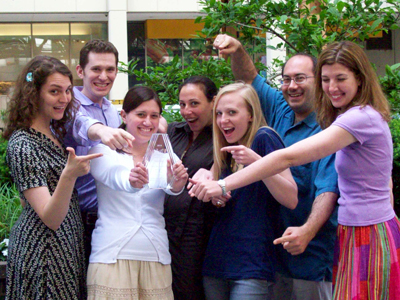
We have some exciting news to share with all of you! Last night, Oy!Chicago took home the top prize for best external website at the 2010 PRSA (Public Relations Society of America) awards dinner.
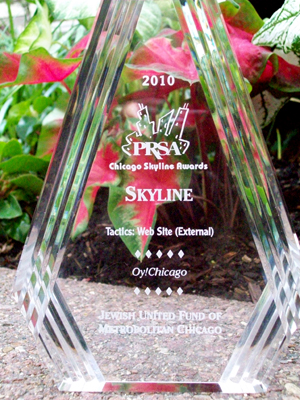

We have some exciting news to share with all of you! Last night, Oy!Chicago took home the top prize for best external website at the 2010 PRSA (Public Relations Society of America) awards dinner.

How listening to Bon Jovi, watching a Billy Crystal flick, and giving away a prom dress can make you happier
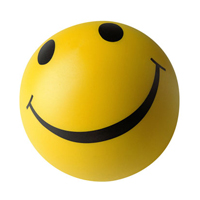
The prom dress
Last year, I won a dress in a raffle. The gown happened to be designed by my favorite designer, one that I don’t typically buy from because… well…her clothing costs almost as much as my monthly rent. As I approached the auctioneer to claim my winnings, I contemplated the perfect occasion to wear the dress. But as I looked at my prize up close, I saw the dress wasn’t my size. So I tucked it away in my closet and let it gather dust.
Many months later, this spring, I volunteered at the Glass Slipper Project, a charity that donates dresses to underprivileged girls to wear to their prom. Volunteers are matched with the teens, acting as their personal shoppers to help them find dresses and accessories for their big night out.
And there it was—while volunteering, I had finally found the perfect occasion for the dress.
I saw one of the young women grab my dress from the rack, try it on, and take it home. Envisioning that girl feel like a princess on her prom night brought tears to my eyes. Knowing she would wear the dress made me so much happier than wearing it myself ever could.
‘The Happiness Project’
The happiness I felt for that young woman got me thinking about what makes people happy. And really, what’s more important to think about? I scoured the Borders bookshelves and found dozens of titles on the subject—apparently I’m not the only one with happiness on my mind.
During my research, I read two books. “The Happiness Project,” (HarperCollins Publishers) by Gretchen Rubin, is about a Manhattan lawyer, wife, and mother of two young girls, who sets out on a quest to make her life the happiest it could be by making small changes—singing in the morning, cleaning her closets, and spending more time with her family.
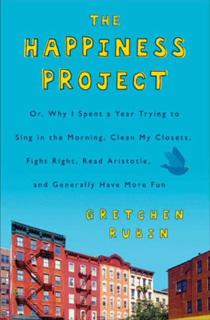
Then, I read “29 Gifts,” (Da Capo Press) by Cami Walker, the true story of a 33-year-old newlywed woman, diagnosed with multiple sclerosis, who was feeling really sorry for herself. A medicine woman recommends that Walker give away 29 gifts in 29 days as a way to get outside of her own headspace. “By giving,” the woman tells her, “you are focusing on what you have to offer others, inviting more abundance into your life.”
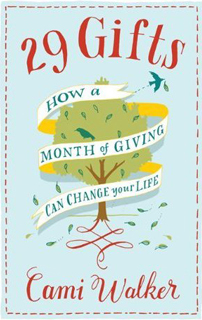
Both books argue that performing acts of kindness not only brings happiness to others, but raises your own sense of happiness too. In one study, psychologist Sonja Lyubomirsky researches different sources of happiness. One of the best, according to the psychologist, is performing acts of altruism or kindness, such as visiting a nursing home, helping a child with homework, or mowing a neighbor’s lawn. Doing five acts a week, especially all in a single day, substantially boosted the happiness of the subjects in Lyubomirsky’s study.
Committing deeds of loving kindness, gemilut hasadim, is central to Judaism. The Talmud teaches that giving to others brings us closer to God (Sotah 14a): “…We should follow the attributes of the Holy One of Blessing. As God clothes the naked, you should clothe the naked. The Bible teaches that the Holy One visited the sick; you should visit the sick. The Holy One comforted those who mourned; you should comfort those who mourn. The Holy One buried the dead; you should bury the dead. Rabbi Simlai taught: The Torah begins with deeds of kindness (gemilut hasadim) and ends with deeds of kindness.’”
Kindness boosts the happiness of both the recipient and the giver and, as a result, happiness circulates in the world. This concept is what Kabbalah (Jewish mysticism) teaches us. We are taught to repair the broken world, and that everything we do, good or bad, large or small, affects the balance of the universe. Take the story of the prom dress. I was happy for the young woman who chose my dress. I just know she felt happy wearing it on her prom night, and perhaps she’ll pay the favor forward some day by giving back. Maybe she too will volunteer for the Glass Slipper Project one day, having had such a positive experience as a recipient. One good deed will circulate a lot of happiness in the world.
My guide to happiness
In “The Happiness Project,” Rubin identifies 12 ways she has achieved greater happiness. Here are a dozen of the ways I find happiness in my life. I hope they’ll make you happier too.
1) This summer, walk, jog, bike, or swim by the lake: For one thing, exercise releases endorphins in the brain, which help boost your happiness. Plus, whether you’re in a good mood or a bad one, looking out at the water makes you realize how small we all are compared to a great big world.
2) Look up at the sky: Sunsets, the skyline, the stars, clouds shaped like animals…There’s a lot of cool stuff up there.
3) Listen to cheesy 80s music: A few recommendations from my iPod playlist are Journey’s “Don’t Stop Believin’” Bon Jovi’s “Livin’ on a Prayer,” and anything Madonna.
4) Call your grandparents often: They’ve led fascinating lives and they’re smarter than you.
5) Just give: No matter what you give—a meal, a dollar, a smile, your time—there’s someone out there who needs it more than you.
6) Watch “When Harry Met Sally:” It’s just the best movie ever. And that line—when Harry tells Sally that “when you realize you want to spend the rest of your life with somebody, you want the rest of your life to start as soon as possible”—is just the best line ever.
7) Spend time with people who really get you: Whether they’re significant others, family, or friends, hang out with the people you really like and spend less time with the people you don’t.
8) Eat S’mores: It’s an unscientifically proven fact that no one has ever been unhappy while eating S’mores. Bonus points if you can eat `em over a campfire, but a microwave works too.
9) Tuck in a kid: From time to time, I get the joy of tucking my 2- and 5-year-old nephews in for the night. We read together (usually the same book 4 times in one evening) and we recap the adventures of their day (they have this way of making mundane activities seem fun and extraordinary). Find a kid, either your own or someone else’s, to tuck in.
10) Share Shabbat with people you care about: Even if you’re not religious, Shabbat is a nice time to set apart from the rest of the week to reflect and enjoy.
11) Laugh more: According to “The Happiness Project,” a small child typically laughs more than 400 times each day, while an adult laughs only 17 times. Raise that average.
12) Spend money on airline tickets to visit people you love: It’s worth the money.
Oy! wants to read your guide to happiness—Tell us what makes you smile by posting in the comments section below:
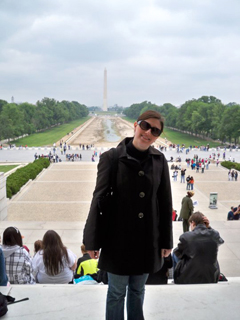
Chicagoans are well-represented in Washington, D.C. these days. Last week, Chicago’s Jewish community was no exception, as 36 members of the Jewish Federation of Metropolitan Chicago’s Government Affairs Committee (GAC) made their voices heard in the capitol—and I got to tag along. For me, this trip—my first time in D.C. since junior high—was an opportunity to see the real ins and outs of Washington and get up close and personal with my elected officials.
Against the backdrop of the nomination of Elena Kagan to the Supreme Court, the BP oil spill, the bomb scare in Times Square, recent passage of health care reform and shaky economic times, we arrived in D.C. to meet with most of the Illinois Congressional Delegation and senior White House officials. In addition to thanking legislators for their continued commitment to Israel and for supporting the Iran Sanctions legislation, this year’s agenda focused on domestic issues including health care reform implementation, IRA Charitable Rollover and Medicaid extension, Workforce Investment Act reauthorization and the Emergency Food and Shelter program—issues that impact the core services of Federation agencies like Jewish Child and Family Services (JCFS), Jewish Vocational Services (JVS), Sinai Health System and CJE SeniorLife.
For all the participating agencies, the need this year is greater than ever.
“Clearly this year we have seen a tremendous rise in families in need,” said Suzanne Franklin, JCFS director of community services. “Those that had never come to our doorsteps before are now seeking help and financial assistance and food subsidies and emergency shelter, and those are our main concerns—being able to be there for those families when they need us most.”
For Roberta Rakove, senior vice president of Government Affairs for Sinai Health System, what goes on in Washington is crucial.
“We are incredibly dependent on the government,” she said. “About 60 percent of our patients are covered by Medicaid, 20 percent are covered by Medicare and 13 percent are uninsured, so what happens with health reform, Medicaid and with Medicare is incredibly important to Sinai.”
She, along with Mark Weiner, president and CEO of CJE SeniorLife, came to Washington hoping for an invitation to sit at the table with legislators as they determine the future of health care, among other things.
“I think the mission for us [was] extremely successful because in doing it in conjunction with Federation, we have access to government officials that is just unbelievable. It gives us an opportunity to speak to the key decision-makers and allows us to participate in the framing of the future health care system.”
I also had a chance to talk briefly with Congresswoman Jan Schakowsky, who expressed her thanks to Federation.
“Through the decades, in good times and in bad times, JUF has always been there,” she said. “It’s very helpful for representatives to come to the Hill and present these real life stories—how things work on the ground—to members of Congress. I appreciate these days when JUF comes to the Hill.”
On day one, we met with Illinois Senator Dick Durbin, who spoke favorably and warmly about Federation agencies, particularly Sinai Health System. Both he, and staff from Illinois Senator Roland Burris’s office, were receptive and positive about the issues discussed by the delegation.
Lynn Sweet, Washington Bureau chief for the Chicago Sun Times, joined us over lunch to discuss the exciting goings on in Washington and Chicago’s representation in D.C. “There are so many Chicagoans in the White House,” she said, “I like to call it the 51st Ward.”
We also visited the Israeli Embassy to meet with Public Diplomacy Minister Noam Katz, who discussed the political process between Israel and the Palestinian Authority, the security challenge of Iran, and Israeli-American relations.
On day two of the mission, we split into groups to meet with 18 of the 19 Illinois house delegation. Representative Danny Davis had this message for Chicago’s Jewish community: “When people are able to work together in an organized way, share as much of the same vision as is possible and determine the quality of life worth pursuing and then go out and pursue it, the sky becomes the limit and there’s nothing that cannot be accomplished.”
The final meeting of the trip was at the White House Executive Office Building, where we met with Susan Sher, a Chicagoan who serves as assistant to the President and Chief of Staff to the First Lady; Danielle Borrin, special assistant for Intergovernmental Affairs and Public Liaison; and Heather Higginbottom, deputy director of the Domestic Policy Council.

Whether your sport is baseball or football, or you just love to watch the Olympics, it’s likely Bob Costas has graced your TV screen. The Emmy award-winning journalist, national sportscaster, Olympic commentator and author has covered every major sport since his broadcast career began in 1973. Since then, Costas has covered six League Championship Series, five World Series, and four Super Bowls for NBC Sports, along with the past four Summer Olympics and three Winter Games, including the 2010 Vancouver Winter Games. He has been with NBC sports since 1979, and has also hosted HBO sports and entertainment programs since 2001.
You can catch Costas Monday, May 17 at the Hyatt Regency Chicago for JUF’s Trades, Industries & Professions Division (TIP) dinner for Financial Services, Marketing and Media and Real Estate and Building divisions. Register or get more information.
In a recent phone interview with Oy!Chicago’s Stefanie Pervos, Costas talks Olympics, the current state of sports journalism, what makes Chicago a great sports city and to answer the age old question—Cubs or White Sox? :
Stefanie Pervos: How has sports broadcasting changed over the past 5 or 10 years—how does the web and blogging influence what you do?
Bob Costas: It’s a very mixed bag. You still find people very effectively taking a more or less traditional approach, and you find other people who are talented who have a different kind of new age approach to things…It’s great that everyone has a voice but not everyone’s voice is equally credible, equally responsible. To me, the issue is not the technology itself but how well is it used. If something is poorly written and not credible then it’s poorly written and not credible if it was the first thing off Gutenberg’s printing press. If it’s brilliant and insightful and well written and thoughtful, then I don’t care if it’s on a blog or the front page of the New York Times—it’s still good.
What was your overall reaction to the Vancouver games this winter? What were some of the highlights and low points?
The lowest part for all of us was just before the Olympics began when the Georgian luger, Nodar Kumaritashvili, was killed on a practice run. The high points included Kim Yu-Na’s performance—it was more than just a Gold Medal performance, it was magnificent and elegant—and Joannie Rochette of Canada who got the Bronze in skating just a few days after her mother had unexpectedly passed away—she showed great grace and presence. Lindsey Vonn and Julia Mancuso and Bode Miller bouncing back and doing as well as they did were good stories from an American perspective. And Shawn White is very charismatic and continues to draw people to a sport that they might otherwise not know much about or pay much attention to. And absolutely topping all of it was the last event—the Canadians winning the Gold Medal on their home ice against the Americans in overtime. I mean you couldn’t script a better scenario than that and it just ended the Olympics on a wonderful note. And I thought that Vancouver did a wonderful job hosting and presenting the Olympics
Chicagoans were definitely split in their opinions about the 2016 Olympic bid. Would you have liked to see the 2016 summer games here in Chicago?
I definitely would have liked to see them in the US. That’s a selfish perspective but any US-based Olympics is extremely appealing to American television, and it would have been of great interest to NBC. So, I was somewhat disappointed from that perspective. I understand the pros and cons and there are always going to be reasonable people—they’re not anti-sports or anti-Olympics—who say, look it would be great to have an Olympics but let’s consider the cost and what are we perhaps shortchanging in order to put resources and attention into this. So there is always going to be responsible opposition to an Olympics in any city and I know that existed in Chicago too.
On the other hand just from the standpoint of how good the bid was, in terms of venues and transportation and all the aspects that would go into making an Olympics a successful presentation for an international audience and all the athletes and visitors, I’m told that the Chicago bid was extremely impressive and it becomes kind of apparent that there was and still is some anti-American sentiment within the IOC because of other issues that don’t have much to do with Chicago at all..I was not so much surprised that Chicago didn’t win the bid, although I thought they had a good chance to do it, but it was shocking that they went out on the first round.
What makes Chicago a great sports city?
I think what makes Chicago a great sports city is that first of all it has a long history—with the Cubs, the White Sox, the Bears—these are flagship franchises, as are the Blackhawks. The Bulls history is not as long, since they came into existence in the 60s but because of Michael Jordan and those six championships they have that kind of history behind them. And I think it’s the passion of neighborhoods— it’s a big city but it always has had a great neighborhood feeling to it. It’s a great newspaper town. [Chicago has] had colorful broadcasters which is part of it too, bigger than life personalities bringing you the exploits of a team. You’ve had great successes, like the Bears winning the Superbowl and the Bulls winning all those championships. And then you have all the lovable losers and frustrations—the Cubs, not winning since 1908, and the Blackhawks haven’t won since 1960—and their fans remain loyal. And I think great venues have to do with it too, you know you have Soldier Field and Wrigley Field and those places just ooze history. All these places are distinctly Chicago.
I have to ask—Cubs or White Sox?
I think the White Sox might have the better team this year and I am very fond of the people who run the White Sox. I’m also anxious to see how the Ricketts do with the Cubs. The one thing the Cubs have over almost any team in baseball, unless you’re talking about the Red Sox, is their venue. There’s something about Wrigley Field that is so winning and so charming and so appealing... So with all due respect to the White Sox—you know the White Sox won in 2005, and since it was a year after the Red Sox had won, that broke the longest drought without a World Championship with the exception of the Cubs. And while it was a big deal, for whatever reason it’s nowhere near as big of a deal as if the Cubs were to win, not just in Chicago but on a national basis.
Who, in your opinion, is the greatest Jewish athlete of all time?
This is probably generational, but a) because I like baseball and b) because it’s my childhood I’m going to go with Sandy Koufax…Although I’m not Jewish I certainly remember when Sandy Koufax wouldn’t pitch on Yom Kippur in the World Series and how that filled Jewish fans with pride, especially because he then would come back on two days rest and win anyways, so Koufax was a mensch there’s no doubt about that.

Michael Masters has quite the resume. At just 31, he’s acquired a law degree from Harvard, a Master’s in International Relations from the University of Cambridge and an impressive record of public service on behalf of the City of Chicago — serving in Mayor Daley’s office as an Assistant to the Mayor for Public Safety and now as the Chief of Staff to the Superintendent of Police, Jody P. Weis.
According to the Chicago Jewish News, which did an extensive cover story on Master’s back in March, Masters is, “Jewish and young and smart and modest and wouldn't look out of place in an Abercrombie & Fitch catalog or at one of Chicago's blue-blood law firms.”
Masters will be speaking at an upcoming Friends of the IDF Young Leadership event on May 12 and was gracious enough to take some time out of his very busy schedule to chat with Oy!Chicago:
Cheryl Jacobs: Jews aren’t particularly known for careers in the military or in law enforcement, as an officer in the United States Marine Corp and Chief of Staff of to the Superintendent of Police of the Chicago Police Department, what took you down this path? Did you always plan on a career in law enforcement?
Chief of Staff, Michael G. Masters: I have always been very drawn to public service. The notion of giving back – particularly by those who have had opportunities that many do not - is something that has always been stressed to me by my family. I also have been fortunate to have very good mentors and other people in my life who stressed the value of service, so it has always been my focus. Uniformed services – whether the military, police or fire – have a special significance to me; it is a unique calling for the individuals who make up these entities. I have been fortunate to be given the opportunity to work within and with these organizations.
I would also note, with respect to your question, that in my recent travels, I have met a large number of Jews who proudly serve in their nation’s military and law enforcement organizations…it is an important point to remember, particularly considering the threats that Israel has faced, and overcome.
Take us through your typical work day…
In reality, I have no typical day…which makes my position incredibly interesting, as well as challenging and rewarding. Usually my morning starts at about 4:50 in the morning when I reach for my Blackberry and go through the incidents that have occurred throughout the night, as well as any other information that might have come through; I also go through the newspapers for anything that might be going on or of interest. A lot of what we deal with on any given day is driven by the events that occur in the previous 24 hours. I get to the gym and make it to work between 7 and 7:30. Once at work, it is a balance between ensuring that information is flowing where it needs to, events and incidents are being attended to, guaranteeing that projects are being completed and that the Superintendent’s strategic vision as well as goals and objectives for the Department are being addressed and met. We are constantly working to ensure that the Superintendent’s and Mayor’s vision for the department are effectuated.
What do you love most about what you do?
The people that I have the opportunity to work for and to work with are what I enjoy most about my job; I believe that I have one of the most rewarding positions possible. First, I have had the unique fortune of working for two great leaders, both with amazing vision — the Mayor and the Superintendent.
Another incredible part of my position is the opportunity to work for an organization with the history and traditions of the Chicago Police Department and on behalf of our officers. The men and women of the Chicago Police Department are some of the most dedicated people that I have been privileged to know. Everyday, 24 hours a day, 365 days a year, they are out on the streets – answering calls, running down dark alleys, moving through buildings - working hard to serve and protect our city…and each of us. It is an honor to serve in a capacity where I can work to try to support their efforts to keep our streets safe, and help make the lives of the residents of our city better.
You just returned from a JUF law enforcement mission to Israel. What was your overall experience on the trip?
Visiting Israel in a law enforcement capacity is a very interesting experience made more unique by sharing it with individuals who have never been there before. It was a learning opportunity and a great observational experience as well. The Chicago Police Department is one of the most advanced departments in the world, in terms of technology, equipment and deployment and intelligence capabilities, so it was a great opportunity to share information and ideas with similarly situated police departments and organizations.
What was it like working with the IDF?
The interaction between the security agencies, police and military in Israel is truly unique; the IDF plays a large role in all of Israeli society – as most of your readership is aware – and they have a significant level of responsibility in a variety of areas outside of what most Americans would view as the role of a military organization in a democratic society. In Israel, this sharing of responsibility seems to work well; our briefings and meetings with the IDF, as well as opportunities for sharing information with the representatives from the military, was very interesting. The individuals we interacted with from the IDF were dedicated, mission-oriented and deeply committed to their country; it was a great experience working with them.
Can you give Oy!Chicago readers a preview of your talk for the May 12, FIDF Young Leadership event?
I will be discussing my observations regarding the training and capabilities of both the organizations that we interacted with [in Israel] as well as our own domestic law enforcement agencies. I will talk about the comparative capabilities of both, with a focus on best practices. Chicago is well ahead of the curve; we are one of the most advanced police departments in the country, both with respect to technology as well as the use of analytics and intelligence in deployments. The Mayor continually challenges us to work harder as well as smarter; at the Superintendent’s direction, the result has been an adaptive and advanced police agency. Our interaction with other entities, and the Israeli government in this case, demonstrated that; I will be discussing the nature of that capability in a variety of scenarios.
What's your favorite Jewish thing to do in Chicago?
Eat at Hub51.
Join Friends of the IDF Young Leadership for a dessert reception with Masters on Wednesday, May 12, at 7 pm. The event will take place at 250 East Pearson Street, 37th Floor. Tickets are $10 in advance/$15 at the door. Register here.
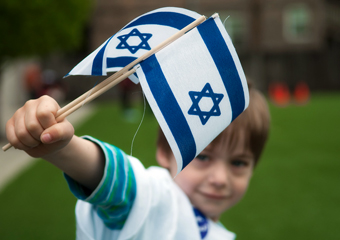
City Walk. Photo credit: Eric Devir
More than 10,000 spirited people came together at seven different locations throughout the Chicago metropolitan area Sunday for Israel Solidarity Day featuring the Walk with Israel. The event, which celebrated Israel’s 62nd anniversary, featured six-kilometer walks, the festive beats of the King David Drummers, along with other entertainment and food at each location.

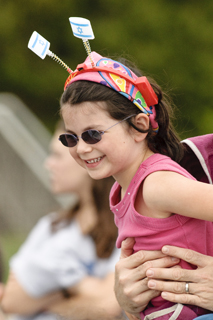
North Suburban Walk. Photo credit: Bob Kusel
This year, participants had a second reason to celebrate—the day also marked the 150th birthday of Theodor Herzl, the father of modern Zionism. Beautiful weather also gave participants a reason to come out and celebrate.
“It’s been an amazing experience, to see all these people out enjoying a beautiful and sunny day, getting ready for the activities and to walk, there is nothing more than we can ask for,” said Kim Frankenthal, who co-chaired the day's events along with her husband, Stuart. “Israel is something that has always been special in our hearts,” Stuart Frankenthal added. “We’ve traveled many times, it’s our homeland and that’s what is important—we have a homeland to go to.”
All of the money raised at this year’s event will go towards “Supplies for Success,” a program that provides students in JUF’s Partnership 2000 Region of Kiryat Gat-Lachish-Shafir with basic school supplies like pencils, pens, paper and backpacks.
“I love Israel Solidarity Day because it’s a way to celebrate our homeland,” said Igor Kravchenko, 24, who attended the Northwest Suburban Walk in Buffalo Grove with Russian Hillel. “Aside from a great way to spend a Sunday, I think it’s a very great cause. Am Yisrael Chai!”
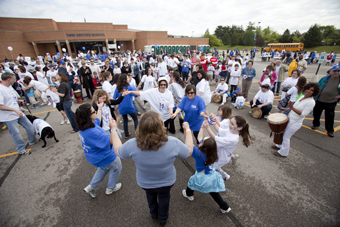
Northwest Suburban Walk. Photo credit: Steve Donisch
Lee Lazar, chair of the Near West Walk, said he loves the annual event because "it’s a wonderful day for the community to come together in support of Israel and a great day to spend with my family and the [families] in the community...to just really have some enjoyment in support of a cause and in recognition of something that means a lot to us. I’m always going to be involved in Israel Solidarity Day, I love it!”
Congressman Jesse L. Jackson, Jr. gave remarks at the South suburban walk in Flossmoor. “The south suburban Jewish community has always spoken loudly for Israel with one passionate, unified voice and it has been my honor to be your megaphone in Washington for the past 15 years,” he said. “As you know, I have always stood as a champion of Israel in the Congress. And now, more than ever, our support for her must be unwavering.”

South Suburban Walk. Photo credit: Aaron Cohen
Congressman Mark Kirk shared the following remarks in Highland Park: “…We have an unbreakable alliance with the State of Israel…the foundation for our alliance with Israel is not based in the State Department, it is not based in the defense department, it is based with the elected representatives, Democrats and Republicans, who will stand with the State of Israel.”
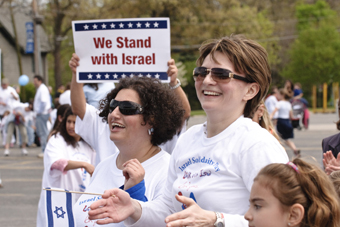
North Suburban Walk. Photo credit: Bob Kusel

North Suburban Walk. Photo credit: Bob Kusel
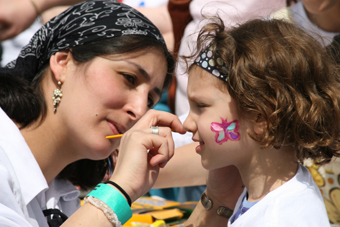
Skokie/Lincolnwood/Rogers Park/Peterson Park Walk.
Photo credit: Brian Houck
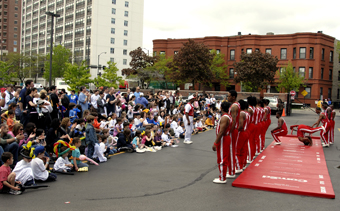
City Walk. Photo credit: Lindsey Bissett

Skokie/Lincolnwood/Rogers Park/Peterson Park Walk.
Photo credit: Brian Houck
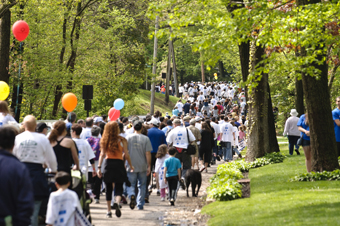
North Suburban Walk. Photo credit: Bob Kusel